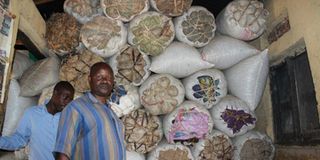Ibanda farmers register success

Some of the farmers with their produce in the stores. The ones marked with red have had samples taken for aflatoxin testing. PHOTO BY BEATRICE NAKIBUUKA
More than 80 per cent of Ugandans live in rural areas and depend on agriculture for their livelihoods. So, it is vital to improve the agricultural practices of smallholder farmers for improved livelihoods.
It is against this background that the Production for Improved Nutrition project (PIN) implemented by Reco Industries has reached more than 82,000 smallholder farmers.
There is also a big number trained—a total of 40,000 lead farmers in 21 districts have been equipped with modern farming skills. This was via the farmer field school approach.
Increased in quantity and quality
Benson Tayebwa, the district production and marketing officer, Ibanda, points out that there has been an increase in agricultural production in the district. This is especially in groundnuts, beans and soya beans since the implementation of the project in 2012.
“This place was known for undernutrition because we could not have enough food for the children. There was low quality output for only home consumption but in the last three years, production has steadily increased both in quantity and quality,” he says.
“Proper harvest handling is very important because if not handled properly, your energy can just go to a waste.”
Aflatoxin test
The farmers have acquired skills right from land preparation, seed selection, ensuring spacing between the crops, fertiliser use, disease, pests and weeds control as well as proper post-harvest handling.
After harvesting, the crops must be exposed to enough sunlight so that they dry properly. This will prevent the development of moulds and fungus.
The moulds and fungus, which usually grow in legumes and maize, produce aflatoxins that are carcinogenic and reactive to the liver after metabolism, which causes cancer of the liver.
“Uganda’s export potential in agricultural products has fallen because they are found to contain aflatoxins. This is the reason they are rejected on international markets because they are not properly dried or stored,” Tayebwa notes.
The aflatoxins test is a mechanism of testing food before it is exported or eaten. During the test, a sample of the products is taken and tested to ensure that there are no moulds or fungus.
With the training by PIN, farmers in Ibanda are able to sell their products at a higher price because they usually pass the aflatoxin test.
The project also links these farmers to produce buyers, who pay a better price if the products conform to the quality standards.
A case in point that Tayebwa cites is the previous harvest season. The farmers made a profit of Shs500 per kilogramme of groundnuts sold.
The farmers are able to beat this quality by using solar driers and storing the legumes in a cool dry place.
He also encourages farmers to wait for the crops to mature and always harvest in the dry season because there is plenty of sunshine that will enable proper drying of the grains.
Amos Twesigye, the chairperson, Muziza Central Farmer’s Group, in Bisheshe Sub County, Ibanda District, observes that since they formed a farmer’s group, their income increased. They also have a higher bargaining power compared to the time they were operating individually.
Better markets
The Muziza farmers’ group has 18 members who basically produce groundnuts and maize and already have a market for their products.
Twesigye says, “We got training on better farming methods which we have implemented to improve our income. We sell the maize and groundnuts to Reco Industries and KKI. They take samples of our products before we sell to them at higher prices when the samples pass the aflatoxin tests.”
He adds that through the Usaid Uganda PIN project, they were linked to buyers for their produce.
These buy the groundnuts at Shs3,200 per kilogramme compared to Shs2,700 on the general market for other individual farmers in the same area.
Inspite of the success stories, there are many challenges that the farmers still face. The effects of climate change counts as one of the biggest.
This is because “there are usually delays in the rains and sometimes phase out prematurely yet we entirely depend on weather for farming.”
Challenges remains
Tayebwa also attributes poor agricultural products to fake seeds. “There are a few places from where we buy genuine seeds. Many times farmers buy fake seeds that are of poor quality as there are few places from which we can get genuine seeds,” he says.
Not all the farmers are well organised into groups to find a market for their products. Therefore, there is little bargaining power and the prices offered are very low.
“With the absence of farming groups, the middlemen take advantage of farmers and offer low prices even when the products are of a high quality,” notes Tayebwa.




